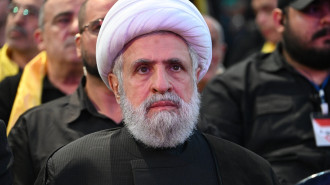
Bashar al-Assad's hollow victory in Syria

Many Syrians were incensed last week at the appearance of Bashar al-Assad at the Arab League, twelve years after he was suspended due to his brutal crackdown on pro-democracy protests in 2011.
On the day of the Arab League meeting, thousands of Syrians took to the streets in over 15 towns across northern Syria in mass protests against the decision. One protest in Idlib was held under a large banner that read: “Syria is not represented by Assad the criminal”.
It was a major policy U-turn from Arab states that had initially pushed for Assad’s suspension from the League over a decade earlier and had even gone so far as to arm opposition groups.
"While Arab states are able to offer Assad a red carpet, they cannot offer him an economic lifeline"
Some saw it as an inflection point in the Syrian crisis, a major development in the wave of normalisation that could see Assad and his regime ultimately rehabilitated on the world stage. With this process, any hope of change in Syria will be lost.
The New Arab spoke to a range of Syrian thinkers and figures who offered an unexpectedly different reading on the development. While many Syrians had an understandably emotional reaction to the decision, since 2017 Arab states have reduced their role in support of the pro-democracy movement. In this respect, returning to the Arab League was merely a final conclusion of that trajectory.
“At the end of the day, it’s a bunch of dictators welcoming in another dictator,” a former Syrian politician based in Turkey, who did not want to be named, told The New Arab.
Furthermore, intractable problems remain a major challenge to the ultimate rehabilitation of Assad, with the regime remaining threatened by the fragile economic landscape it occupies. The economic crisis in Syria is bleak, deep-seated, and far from improving even within this new political climate. In 2022, Syria was ranked third in the fragile states index.
“In many ways, the state has already collapsed and we will only see continued deterioration,” Jihad Yasigi, a Syrian economic expert based in Paris, told The New Arab.
The Arab League decision did nothing to return confidence to the economy and the Syrian pound continued to depreciate, reaching an all-time low of 9,000 Syrian pounds to the dollar.
|
|
“The whole economy is underwater,” a Syrian economic expert based in Amman, who wished to remain nameless, said. “This will be the status quo until sanctions are lifted,” he added, referring to widespread international measures against the regime. The US Caesar Act is the most critical of these sanctions on the regime for its atrocities against the Syrian people.
Neither of Assad’s backers, Iran or Russia, are able to save the Syrian economy, and with these sanctions in place Arab states are highly restricted on what investment they are able to make in the country.
While there are rumours circulating that Saudi Arabia will offer the regime $4 billion to stop the captagon trade, even such a sum is not enough to rescue Syria’s economy. “This amount is merely a bandage,” Syrian expert Murhaf Jouejati, a professor in the US, told TNA.
"People remain fearful in Syria that the Arab League decision could change Western positioning"
“Whatever money they will give will be funnelled to the elite and the security services. We saw this with aid, a trickle will reach people and it won’t make a difference. The state of the economy is such a shambles.”
The bill for reconstruction in Syria was estimated in 2017 to be around $400 billion, and this was long before the earthquake hit northern Syria and southern Turkey in February 2023. So, while Arab states are able to offer Assad a red carpet, they cannot offer him an economic lifeline.
In response to moves towards normalisation with the Syrian regime, Western states have reiterated their policy positions that they will not support reconstruction, and sanctions will not be lifted, unless they see “genuine, comprehensive, and enduring reforms and progress on the political process” and definite progress towards the implementation of UN Resolution 2254.
Many consider this to be a guarantee that while the regime is hamstrung by the economic downturn, no substantial help will be provided until it engages in meaningful political change, and the incentive of sanctions relief remains the ultimate carrot.
For a long time, a state of stagnation has plagued the Syria file, with meagre political investment translating into little political progress. A former Syrian politician now based in Turkey, who did not wish to be named, said that renewed political investment could be a positive thing.
“Sometimes any movement is a good thing. It’s good the Arabs want some influence in Syria as long as they stick to UN resolutions,” he said. But he stressed that these developments would hinge on the West’s role. “If they can work in tandem then it could lead to something meaningful. The concern is when you see the West descending from their red lines.”
|
|
This fear was highlighted by others inside Syria. Osama Abu Zaid, a former detainee based in north Syria told TNA that “people remain fearful in Syria that the Arab League decision could change Western positioning”.
His concern is based on a history of the gradual erosion of Western positioning since the Obama administration’s initial disregard of his own “red line” over the use of chemical weapons. In the context of normalisation, Biden said he was “encouraged” by a meeting in Amman that paved the way to Syria re-joining the Arab League, in what indicated a significant watering-down of US policy language.
"It remains essential for the West to stick to its red lines and harness this policy momentum to address the core aims of Resolution 2254"
In recent years the political process has been reduced to the proven failed constitutional committee and a focus on peripheral issues rather than the core aims of 2254 to find a durable political solution to the conflict that “meets the legitimate aspirations of the Syrian people”.
While key Arab states’ main motivation to reengage with Syria was for national security concerns such as the captagon trade, there remains a risk that a political track will be reduced to something token rather than a substantial meaningful process.
Within this context, it remains essential for the West to stick to its red lines and harness this policy momentum to address the core aims of 2254. Now is a key opportunity to begin to explore new tactics and strategies with Arab partners to progress towards such aims.
Lara Nelson is the Policy Director of ETANA Syria, an organisation focused on informing international policy on Syria, and has worked on Syria since 2013 from Jordan and Turkey. She previously worked as an independent consultant for the political and military sides of the moderate Syrian opposition. Lara speaks fluent Arabic and holds a BA degree from Oxford University and an MA from SOAS.
Follow her on Twitter: @LN_Lara1






 Follow the Middle East's top stories in English at The New Arab on Google News
Follow the Middle East's top stories in English at The New Arab on Google News


